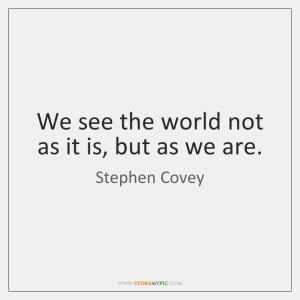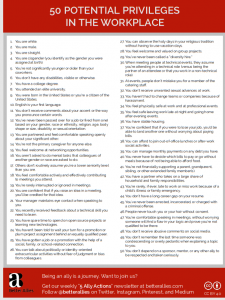What do we mean when we say ‘Privilege’?
In our Diversity and Inclusion work, we often talk about ‘privilege’. It is a strong word and, for most people, it feels a bit prickly to think about being privileged.
In the recent #blacklivesmatter movement, this word was used to discuss ‘white privilege’ and we could see the defensive reaction from people in stating ‘all lives matter’. It is true that all lives matter BUT in this scenario the cause wasn’t disputing this. Black Lives Matter was raising the systemic prejudice and bias that Black people face every day and that as a community we needed to learn and understand this. Our white privilege would stop us really seeing or understanding what that prejudice really felt like for a Black person.
We all have lots of different identities and will face our own perceptions and experiences of challenges because of those identities. That is why many organisations and groups focus on supporting different identities and trying to raise awareness of bias or challenges for each identity, whether it be race, gender, age, religion, disability etc.
Why should we accept that we have privileges?
By doing so we are admitting that not everyone sees the world from our perspective and that we have privileges in our life that have bounded our awareness of the world.
From our work in psychology we often share a theory called ‘Bounded Awareness’. Bounded awareness is a process in which humans do not see all pieces of information that is available to them. We are more likely to be aware of information that is useful or relevant to us. It is information that we can process and make sense of. I am sure we have all experienced bounded awareness, some examples are:
- You buy a new car and all of a sudden you notice all cars similar to yours
- Someone tells you about a job in a new company you haven’t heard of, and then you pass this company on your way home and notice it
- Your friend tells you they would love a red coat, and on your next shopping trip you notice lots of red coats
- You or a family member announce they are expecting a baby and you notice a lot of pregnant people
- Someone mentions a TV advert you haven’t seen, and then later that day you see it on TV.
The above are examples of events or things that were always around us, but our new awareness allowed us to now actually notice them.
How does this play out in terms of Diversity and Inclusion?
We see the world from our view and we actually have a blind spot bias in terms of not being able to see our own biases, which clouds our view. We also have stereotypes, and confirmation bias encourages our brain to look for confirmation of our stereotypes. Affinity bias also supports that we prefer to ‘hang out’ with people similar to us, so we surround ourselves with people who look and think like us. All of these biases work to cloud our view and bound our awareness of different views of the world.

Bounded awareness can really limit our decision making and there is a great article from HBR (written by Max H Bazerman and Dolly Chugh) in which highlights that bounded awareness can stop us seeing, sharing, or seeking information as we think others will have understood or think like us, it is informative for learning to improve your decision making. “Most executives are not aware of the specific ways in which their awareness is limited. And failure to recognize those limitations can have grave consequences”.
So back to privilege. Privilege is just our way of experiencing the world, and our experiences may have given us some privileges that stop us seeing or understanding different views of the world.
Review you own potential privileges
There is a great list of privileges shared by Karen Catlin from ‘Better Allies’ which you can review (I also recommend this book and Karen’s weekly newsletter where she shares great insights for challenge bias and privilege).

You can review the list and see how many privileges you experience. The aim is that this self-reflection will help you be more open to listening to others about their view of the world. For those in organisations, this is essential learning to be able to create a more inclusive culture.
Example of Privilege
One example of how this can help with conversations and inclusive actions is from an organisation I worked with, where a leader thought that a female colleague wouldn’t travel for work and this was causing a barrier for her career progression. His bias had created a shortcut of thinking to assume that it was because of childcare responsibilities. When encouraged to ask his female colleague advised that it was actually a safety issue. The county they had to travel to meant that flights were arriving late at night and she felt unsafe traveling in the city at that time. The leader was surprised and hadn’t considered safety as he didn’t worry about getting a taxi late at night – his privilege was he didn’t have to worry about safety. A quick change in planning meant flights were arranged so people arrived during daytime and staff felt safer, therefore, being more inclusive for all to travel.
Think about some of your shortcuts of thinking that might have come from your privilege – what new conversations could you have with your teams? How could you help make workplaces more inclusive?
Some conversations may feel challenging or difficult, but this is how we keep learning and challenging our bounded awareness.
Do read about our work in the field of Diversity and Inclusion &
If you would like to discuss this post further, then please contact clare@cmcbp.co.uk








